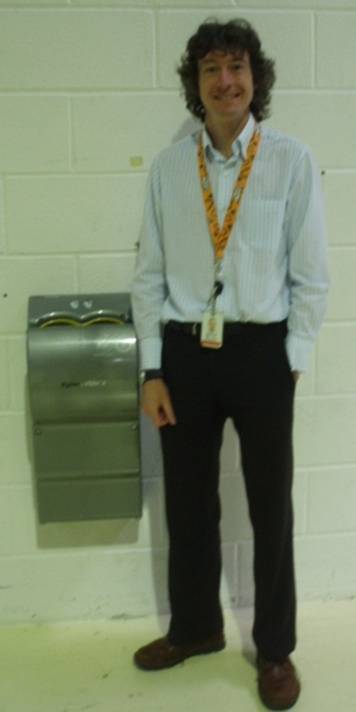How do you describe your job when you meet people at a party?
I’m a scientist working in R&D for Dyson
What is ‘cutting-edge’ about your work?
All of our efforts are about trying to make great products and usually that means we have to solve difficult problems in a commercially viable way; often that can lead to a solution that no-one has thought of. I am also involved in a project at Cambridge University which is breaking new ground.
What are the biggest implications your work will/could have in the future?
Well, Dyson is about making great products so it is likely that thousands of people are using a product I have worked on right now. If they work well then they might buy another and that will mean I get to continue to do interesting things at Dyson in years to come!
Describe some of the highlights of your average day.
Most days I get to work in the lab and discuss results and problems from the latest prototypes and experiments, talk about how to get our research working in the developing projects and quite frequently review new ideas with Sir James Dyson.
Describe briefly how your career has progressed to date.
I started off working in the chemical industry taking lab scale reactions to full scale plant manufacture, I then moved to work in R&D on household and personal products for Unilever, leading a science area involving human underarms and getting some project leadership experience. I moved to Dyson in 2003 to work on laundry machine projects there and now lead a research team which is a mixture of scientists and engineers. We have a very wide remit from vacuum cleaners to washing machines to hand driers
How is your job cross-disciplinary?
I am the only practicing chemical scientist at Dyson and one of a very few scientists on site. I lead a small microbiology team and an engineering team and work with 250+ engineers therefore all of my work is cross disciplinary unless I’m working on my own! My team tends to deal with idea that involve chemicals, water, biological science etc.
How well is your job compensated? What is the starting salary for your field, and how much can this be expected to rise?
There is a big variety of roles in my field and so the range is huge. The bottom line is that one can make a good living and get a lot of mental stimulus out of it.
How do you see your field developing over the next 5-10 years?
There will be huge opportunities for Chemical Scientists in the next decade as all of the big problems and big solutions are physical science related. Energy, fuels, materials, biotechnology, water supply, climate change etc. There is also a big recognition that it’s at the boundaries between disciplines where some of the biggest breakthroughs occur
What’s the most unexpected thing about your job?
There is almost no experiment or idea that we don’t consider trying, just in case it works or leads us to an interesting result
What’s the biggest achievement of your career so far?
I’m most proud of the Dyson Airblade™ which I’ve played a part in over many years. It’s a really good product; it works better and is more environmentally friendly than the competition.
